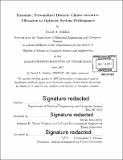Dynamic, personalized discrete choice incentive allocation to optimize system performance
Author(s)
Sukhin, David A.
Download1017487508-MIT.pdf (3.503Mb)
Other Contributors
Massachusetts Institute of Technology. Department of Electrical Engineering and Computer Science.
Advisor
Moshe Ben-Akiva.
Terms of use
Metadata
Show full item recordAbstract
Incentivization is a powerful way to get independent agents to make choices that drive a system to a desired optimum. Simply offering compensation for making a certain choice is enough to change the behavior of some people. If you incentivize the right choices, you can get closer to your desired choice-dependent goal. Ways to optimize these choices in an environment with many choices and many users is essential for achieving goals for the least cost. I examine how a model that is aware of the utility function of each choice and for each user in a system can optimally allocate incentives in real time while considering opportunity cost, personalized incentive response behavior, and maximizing marginal results. This method is useful in systems that have direct and private communication with each user but are limited by having users enter the system at different times. The method must offer a menu of choices and incentives on demand while still considering users that are yet to come. I discuss several solutions and benchmark them on the TRIPOD traffic optimization system which aims to incentivize users to make energy efficient daily commute choices. The final model incorporates user personalized incentives and opportunity cost of each incentive to achieve the optimal incentive allocation on an ad-hoc basis.
Description
Thesis: M. Eng., Massachusetts Institute of Technology, Department of Electrical Engineering and Computer Science, 2017 Cataloged from PDF version of thesis. Includes bibliographical references (pages 37-38).
Date issued
2017Department
Massachusetts Institute of Technology. Department of Electrical Engineering and Computer SciencePublisher
Massachusetts Institute of Technology
Keywords
Electrical Engineering and Computer Science.